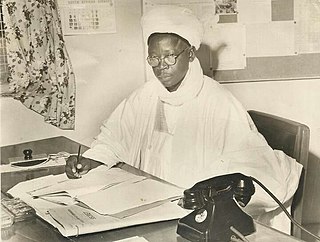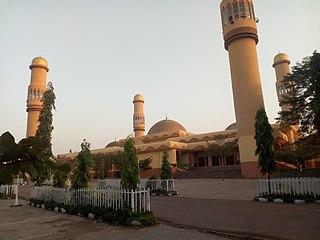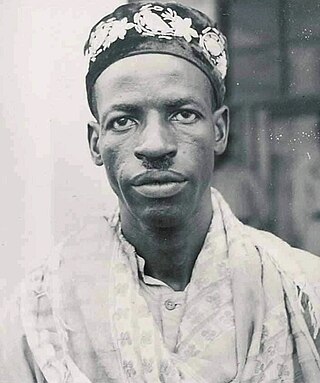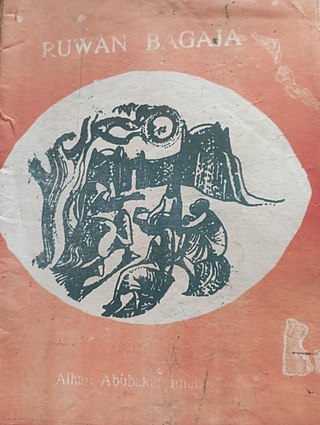
Northern Nigeria was an autonomous division within Nigeria, distinctly different from the southern part of the country, with independent customs, foreign relations and security structures. In 1962, it acquired the territory of the British Northern Cameroons, which voted to become a province within Northern Nigeria.

Zaria is a metropolitan city in Nigeria which lies within four local government areas in Kaduna State; it is the capital city to the Zazzau Emirate Council, and one of the original seven Hausa city-states and a major city in the state. The local government areas that made up of the city of Zaria includes: Zaria Local Government, Sabon Gari Local Government, Giwa Local Government and Soba Local Government areas in Kaduna state, Nigeria.

Gobir was a city-state in what is now Nigeria. Founded by the Hausa in the 11th century, Gobir was one of the seven original kingdoms of Hausaland, and continued under Hausa rule for nearly 700 years. Its capital was the city of Alkalawa. In the early 19th century elements of the ruling dynasty fled north to what is today Niger from which a rival dynasty developed ruling as Sarkin Gobir at Tibiri. In 1975 a reunited traditional sultanate took up residence in Sabon Birni, Nigeria.

Ahmadu Ibrahim Bello, also known as Sardauna of Sokoto KBE, knighted as SirAhmadu Bello, was a conservative Nigerian statesman who masterminded Northern Nigeria through the independence of Nigeria in 1960 and served as its first and only premier from 1954 until his assassination in 1966, in which capacity he dominated national affairs for over a decade.

Abubakar Imam ' was a Nigerian writer, journalist and politician from Kagara, Niger in Nigeria. For most of his life, he lived in Zaria, where he was the first Hausa editor of Gaskiya Ta Fi Kwabo, the pioneer Hausa-language Newspaper in Northern Nigeria.

Barewa College is a college in Zaria, Kaduna State, northern Nigeria. Founded in 1921 by British Governor General Hugh Clifford, it was originally known as Katsina College. It switched its name to Kaduna College in 1938 and to Government College, Zaria in 1949 before settling on Barewa College. It is one of the largest boarding schools in Northern Nigeria and was the most-celebrated post-primary schools there up to the early 1960s. The school is known for the large number of elites from the region who attended and counts among its alumni include Tafawa Balewa who was Prime Minister of Nigeria from 1960 to 1966, four heads of state of Nigeria. The school is located along Gaskiya road in the Tukur -Tukur area of Zaria.

The Hausa are a native ethnic group in West Africa. They speak the Hausa language, which is the second most spoken language after Arabic in the Afro-Asiatic language family. The Hausa are a culturally homogeneous people based primarily in the Sahelian and the sparse savanna areas of southern Niger and northern Nigeria respectively, numbering around 86 million people with significant indigenized populations in Benin, Cameroon, Ivory Coast, Chad, Sudan, Central African Republic, Republic of the Congo, Togo, Ghana, Eritrea, Equatorial Guinea, Gabon, Senegal and the Gambia.
Danja is a Local Government Area in Katsina State, Nigeria. Its headquarters are in the town of Danja.
Lere is a Local Government Area and town in southern Kaduna State of Nigeria. Lere town is located geographically at the latitude 10 degrees 39 North and longitude 8 degrees 57 East. It is the headquarters of the Lere Emirate. The town and its environs has an estimated population of about 93,290 (2016). Lere Local Government has an area of 2,634 km2 and a population of 339,740 at the 2006 census. Its headquarters are in the town of Saminaka. The postal code of the area is 811.
For the Arab Hutaymi tribe, see Sulluba

The Dambazawa are a Fulani clan residing mainly in Kano State, Nigeria. They were among the key promoters, planners and executors of the Fulani Jihad in Kano, which took place between 1804 and 1807 under the leadership of Shehu Usuman dan Fodiyo. The clan was said to be the top financier of the jihad because it was said to be extremely wealthy at the time of the jihad. Other Fulani Clans that participated in the Jihad included: the Jobawa, the Yolawa, the Sullubawa, the Danejawa and others, as well as a contingent of the native Hausa people led by Malam Usuman bahaushe. Together they formed a formidable force and toppled the 158 year Kutumbawa dynasty led by its last ruler Muhammad Alwali dan Yaji dan Dadi bakutumbe who ruled between 1781 and 1806.

Sultan Bello Mosque also known as The Kaduna Central Mosque, is one of the largest mosques in Kaduna State, Nigeria, built in 1962. It is named after the then Sultan of Sokoto, Muhammadu Bello the son of Usman dan Fodio. The present Chief Imam of the mosque is Suleiman Muhammad Adam, a former lecturer in the department of Arabic and Islamic Studies at Kaduna State University.

Sa'adu Zungur was a Nigerian revolutionary, poet, jurist and nationalist who played an important role in Nigeria's independence movement particularly in Northern Nigeria. He is generally regarded as the father of 'radical politics' in Northern Nigeria. Zungur's political writings criticising the colonial government of Northern Nigeria, especially the emirate system, helped in laying the foundation for the principle of self-determination in Nigeria. His literary and political endeavors influenced a number of the leaders of the independence movement in Northern Nigeria, notably Aminu Kano and Isa Wali.
The Northern Nigerian Publishing Company Limited is one of the oldest publishing company in Northern Nigeria base in Zaria.
Magana Jari Ce the meaning Speaking is profitable or it literally means Wisdom is an asset or "ability to tell stories is a valuable possession" as described by Rupert East, the book is a novel which is considered to be one of the greatest books to have ever been written in Hausa Language across Northern Nigeria. The book is officially recognised in Nigerian Secondary Schools for Hausa subjects and curriculum, The book was written by Abubakar Imam, a prominent author from Northern Nigeria Protectorate. The first edition was first published in 1937 by Northern Nigerian Publishing Company Limited and other parts of the books by Zaria Corporation.

Ruwan BagajaHausa pronunciation:[RuwanBagaja] literally meaning "Water of Cure" is a debut novel written in Hausa language by Dr Abubakar Imam at the age of 22 years, He presented the book during a literature bureau competition organised by Rupert East in the year 1933 in Zaria. Abubakar Imam won second prize for his presented book, thus marking his territory as an author to contend with. With the acclaim from Ruwan Bagaja, he went on to publish nearly 20 other Hausa books including the celebrated three-volume collection of stories Magana Jari Ce.
Hausa literature is any work written in the Hausa language. It includes poetry, prose, songwriting, music, and drama. Hausa literature includes folk literature, much of which has been transcribed, and provides a means of recording, preserving, and transmitting knowledge, especially in regard to social, psychological, spiritual, or political roles.
Pandogari is a town (ward) in Kagara, the capital of Rafi local government in Niger State, Nigeria. There is a large Hill which called Kongoma hill, in Fulfulde (Kwangwamaje), Kongoma hill located at the eastern Pandogari. The distance from the state capital Minna to Pandogari is about 156.7km. Pandogari is headed by a district head called Hakimi in Hausa language, and the current Hakimi of Pandogari is Alhaji Idris Aliyu Jibril. There are three major languages in Pandogari town; they are Hausa, Fulani and Ɓurawa.
Muhammadu is a given name. Notable people with the name include:











